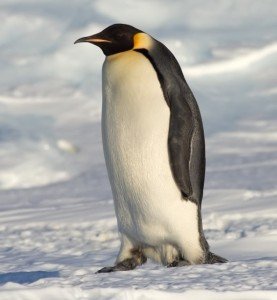A leading Australian researcher, Queensland University ecologist Professor Hugh Possingham, turned the tables on media at a briefing in Auckland today when he quizzed journalists about whether concerns over the loss of penguins in Antarctic and coral reefs closer to the tropics would be enough to stop nations burning the coal which contributes to fossil fuel impacts on rising greenhouse gas emissions.

“I wonder whether the destruction of penguins and coral will stop us burning coal?” he asked on the SMC briefing.
“We can talk about the disastrous impacts of climate change on marine ecosystems .. but do you reckon that’s going to change the minds of the United States, and India and China about burning coal?”
One of 250 scientists, academics and other experts attending the 25th annual congress for conservation biology which began in Auckland today, Professor Possingham said after a three-day “think tank” on marine biodiversity before the conference that communities could stop agricultural run-off and other pollution which led to eutrophication of waterways, or mitigate the impact of fishing, but he was not convinced that concerns over the fate of Antarctica’s penguins or worries over coral reefs dying off would stop unsustainable use of fossil fuels.
Antarctica New Zealand’s science manager, Ed Butler, — who was also participating in the media briefing — said that, personally, he was taking a pessimistic stance: “I don’t think the destruction of corals or coral reefs of penguins will change people’s minds or how they behave”.
Tangible, everyday things such as being able to drive to work or commute without carrying passengers had more immediacy.
There been many doom-and-gloom stories about sea-level rise and other climate change impacts that would hurt human populations tremendously, down to the kinds of crops they could grow or where they lived.
“It’ll be trillions of dollars to move some cities or to protect them – but if we’re not going to do it for ourselves, we’re not going to do it for a fluffy penguin,” he said.
SMC manager Peter Griffin suggested that impacts which affected people personally — such as ocean acidification affecting the paua, mussels and other seafood — would spur engagement.
He suggested the “fluffy animal stories” shouldn’t be underestimated — the New Zealand sojourn of a “lost” Antarctic penguin, nicknamed Happy Feet, had roused widespread public attention — but people would “wake-up” when they were personally impacted.
“What’ll probably hit people in New Zealand quicker is the effects of sea-level rise and changing storm climates for all of those with a bach on the coast,” said marine ecologist Dr Carolyn Lundquist, a NIWA researcher who chaired the think-tank and will head the Oceania section of the Society for Conservation Biology. The spread of mangroves with coastal flooding and any migration south of mangroves with warmer temperatures could also be localised impacts that would quickly attract attention”.
A radio journalist, William Ray, said his personal opinion was that people looked for things they could change in their local environment — such as cleaning up a dirty stream. “I don’t think it’s easy to get people to rally around a massive international issue, especially when it’s out of their hands: burning coal is a government policy thing”.
Professor Possingham said it was important to engage the public, including by using social media, and Dr Butler said polling done by Colmar Brunton for Antarctica NZ had found that New Zealanders generally thought Antarctica should be protected, but there was a “massive gap” in terms of engaging 18 to 34 year-old people.
“It’s probably because we’re not really engaging with those new technologies as well as we should … we need to get more into blogging and onto twitter feeds: basically, keep up with our kids”.
The conservation biology congress will feature include feeds from twitter hash-tag #ICCB.